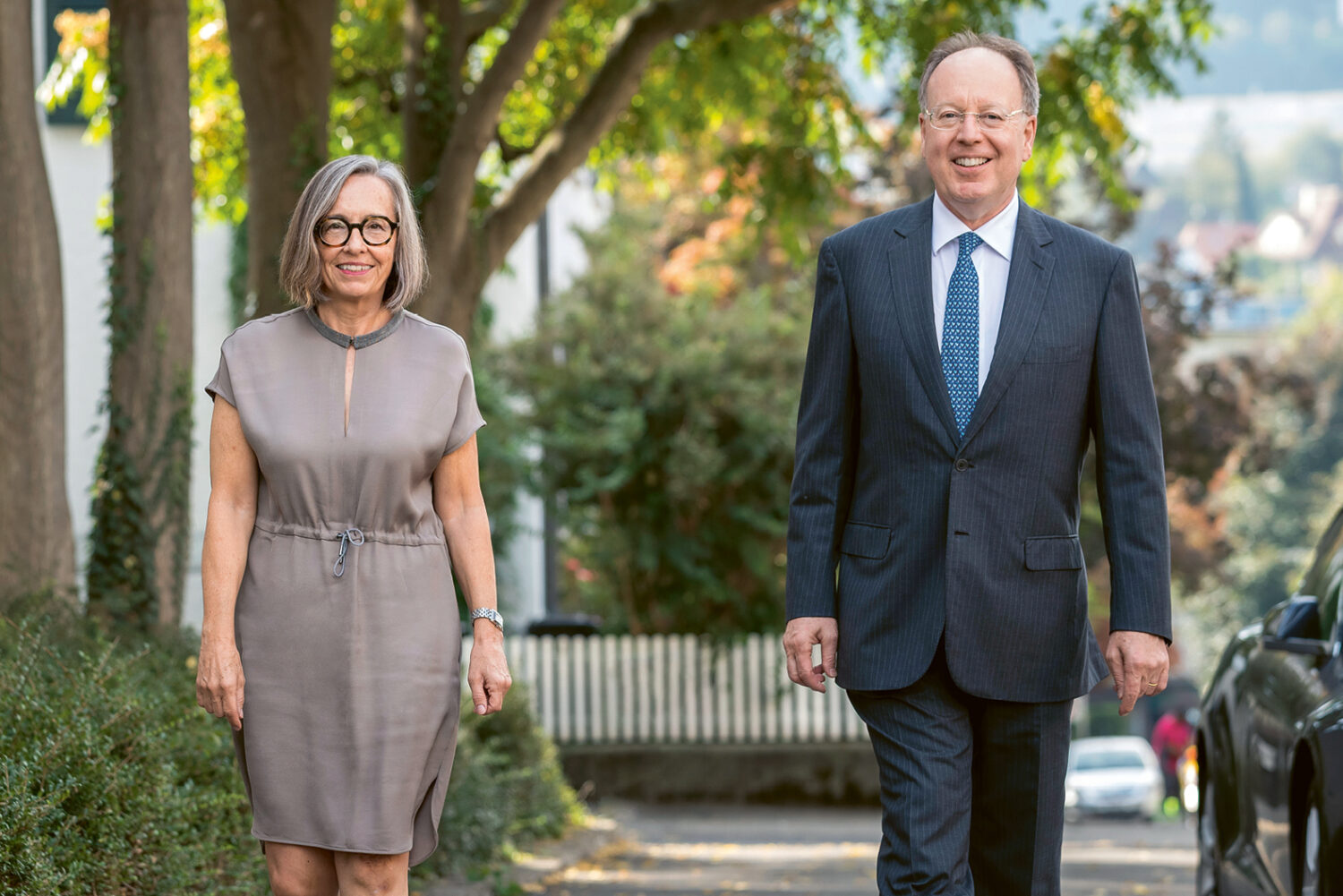
The CEO and the president take a look back at the past year
Maintaining contact with the customers it funds was also very important for Innosuisse during a year dominated by coronavirus. At Empa in Thun, Annalise Eggimann and André Kudelski discover what it takes to create “world-leading innovation – Swiss-made”. The video for the Innosuisse Year 2020 was created during this visit.
High demand despite the crisis
The Covid-19 pandemic also had a strong impact on Innosuisse’s 2020 financial year. Accordingly, we have adapted our support to the situation as quickly as possible during the spring, moving training, coaching, mentoring and other information services into the virtual space. To ensure the continuation of their work, those responsible for ongoing innovation projects were granted project extensions and amendments, or a reduction or waiver of the cash contribution, upon request. Around half of the ongoing projects took advantage of this option. Under the guarantee loan programme, a panel of experts coordinated by Innosuisse provided the participating cantons with their knowledge in assessing guarantee applications from start-ups. Exchanges with grantees, those interested in the offer and other actors in the innovation ecosystem were replaced as far as possible with online events.
Despite the 2020 pandemic, demand for funding support from Innosuisse remained high and testifies to the innovative drive of Swiss researchers and entrepreneurs. In doing so, they are not only ensuring their short-term survival, but are also actively shaping the future.
Growth in all funding instruments
Despite the pandemic and the massive slump in the economy, applications for Innosuisse’s most important funding instrument, the national innovation projects, were in line with original expectations.
472 applications worth CHF 175.2 million (excluding overheads) were approved – an increase of 22% over the previous year. Almost 400 SMEs were supported by our mentors in the launch of innovation projects and other funding applications.
There was also a pleasing increase of around 45% to CHF 28.5 million in commitments for the international projects within the framework of EUREKA, ECSEL and AAL. With the launch of Horizon Europe 2021, delays in calls for proposals are expected, which led to innovation actors being particularly eager to take advantage of the opportunities offered in 2020.
At BRIDGE, the joint funding programme with the SNSF, the course was set for continuation in 2020 and the funding budget was increased by a total of 50% to CHF 105 million for the next four years. As part of the Discovery Projects, new projects from the social sciences and humanities are now also being funded. So far, 122 funded projects have emerged from the 16 calls for proof of concept projects. This has already resulted in 65 start-ups – a great success.
After eight years, the Energy funding programme came to an end in 2020. More than 1,300 researchers had been working at the SCCERs each year on average. They launched over 1,400 projects throughout the duration of the funding programme. The SCCERs have laid a good foundation for making a significant contribution to managing the 2050 energy transition.
Innosuisse realigned two funding instruments for the purposes of networking and knowledge transfer. Already 12 NTN – Innovation Boosters have been launched, which should result in more radical and disruptive innovation projects in important future fields. In addition, Innosuisse now supports a series of events on relevant innovation topics – Networking Event Series – which facilitate an active exchange between research institutions, business, and society at the national level.
Innosuisse has recorded a large increase in the number of participants in the training courses for founders. Module 1 “Business Ideas” in particular met with interest, being accessed over 3,100 times – mostly virtually. The significant increase in the proportion of women, which now stands at 43%, is also gratifying.
The total demand for coaching vouchers also increased by 5% compared with the previous year. A new record was set with 570 actively supported start-ups in the various coaching programmes. For the first time, 11 start-ups could benefit from Scale-up Coaching which launched in 2019 as a coaching programme for start-ups with high growth potential. Among other support options, it offers additional coaches with growth experience and specifically assigned to the programme, as well as support geared towards financing and activities relating to international commercialisation.
Effect of Innosuisse funding confirmed
Not only the high demand for all offers confirmed Innosuisse’s funding activities, but also the results of the innovation survey published in December 2020 by the ETH Zurich's KOF Swiss Economic Institute:
- The companies supported by Innosuisse rank above average in terms of innovative strength, risk-taking and productivity, and exhibit above-average innovation efficiency (cost-benefit ratio);
- The innovation projects and innovation checks are very well geared to the needs of technology-oriented SMEs and are appreciated by them;
- The funded projects are often higher than average risk and have the potential for disruptive and/or radical innovation.
Stronger into the new funding period
The Covid-19 pandemic will continue to affect us all: Innosuisse’s primary aim is to maintain and strengthen the innovative strength and innovative propensity of SMEs and to support SMEs in the accelerated digital transformation and the associated structural change. The additional funds of CHF 130 million allocated by parliament as part of the ERI Dispatch and the impulse programme approved by the Federal Council in November are important prerequisites for providing the necessary support. In addition, the new flagship projects, with their systemic, transdisciplinary approach, will be able to provide important stimuli in thematic areas of great economic and social significance.